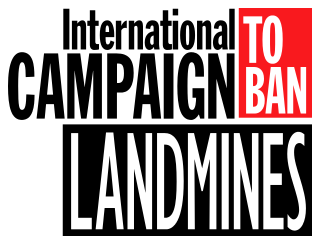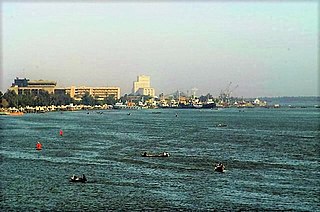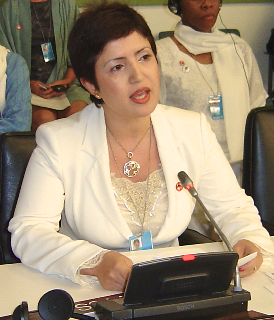Related Research Articles

Depleted uranium is uranium with a lower content of the fissile isotope 235U than natural uranium. Natural uranium contains about 0.72% 235U, while the DU used by the U.S. Department of Defense contains 0.3% 235U or less. The less radioactive and non-fissile 238U constitutes the main component of depleted uranium.

A cluster munition is a form of air-dropped or ground-launched explosive weapon that releases or ejects smaller submunitions. Commonly, this is a cluster bomb that ejects explosive bomblets that are designed to kill personnel and destroy vehicles. Other cluster munitions are designed to destroy runways or electric power transmission lines.

The law of war is the component of international law that regulates the conditions for initiating war and the conduct of hostilities. Laws of war define sovereignty and nationhood, states and territories, occupation, and other critical terms of law.

The International Campaign to Ban Landmines (ICBL) is a coalition of non-governmental organizations whose stated objective is a world free of anti-personnel mines and cluster munitions, where mine and cluster munitions survivors see their rights respected and can lead fulfilling lives.

The Convention on the Prohibition of the Use, Stockpiling, Production and Transfer of Anti-Personnel Mines and on their Destruction of 1997, known informally as the Ottawa Treaty, the Anti-Personnel Mine Ban Convention, or often simply the Mine Ban Treaty, aims at eliminating anti-personnel landmines (APLs) around the world.

Helen Mary Caldicott is an Australian physician, author, and anti-nuclear advocate. She founded several associations dedicated to opposing the use of nuclear power, depleted uranium munitions, nuclear weapons, nuclear weapons proliferation, and military action in general.

The International Peace Bureau, founded in 1891, is one of the world's oldest international peace federations. The organisation was awarded the Nobel Peace Prize in 1910 for acting "as a link between the peace societies of the various countries". In 1913, Henri La Fontaine was also awarded the Prize "[For his work as] head of the International Peace Bureau". As of 2012, eleven other Nobel Peace Prize laureates have been members of the IPB.
Uranium in the environment is a global health concern, and comes from both natural and man-made sources. Mining, phosphates in agriculture, weapons manufacturing, and nuclear power are sources of uranium in the environment.

War can heavily damage the environment, and warring countries often place operational requirements ahead of environmental concerns for the duration of the war. Some international law is designed to limit this environmental harm.

The International Campaign to Abolish Nuclear Weapons is a global civil society coalition working to promote adherence to and full implementation of the Treaty on the Prohibition of Nuclear Weapons. The campaign helped bring about this treaty. ICAN was launched in 2007. In 2022, it counted 661 partner organizations in 110 countries.

The Battle of Basra lasted from 21 March to 6 April 2003 and was one of the first battles of the 2003 invasion of Iraq. The British 7 Armoured Brigade fought their way into Iraq's second-largest city, Basra, on 6 April coming under constant attack by the Iraqi Army 51st Division and Fedayeen Saddam, while elements of the Parachute Regiment cleared the 'old quarter' of the city that was inaccessible to vehicles. Entering Basra had only been achieved after two weeks of conflict, which included the biggest tank battle of the war by British forces when the Royal Scots Dragoon Guards destroyed 14 Iraqi tanks on the 27 March.
Professor Siegwart Horst Günther was a German physician and activist. He once worked with Albert Schweitzer in Africa. He was a prominent proponent of the claim that the use of depleted uranium in munitions causes cancers, birth defects and other pathologies. In 2007 the Nuclear-Free Future Award honored for the third time Prof. Günther for refusing to back down to pressure and for visiting Iraq to study the real-life consequences of depleted uranium use.

Nuclear weapons testing, uranium mining and export, and nuclear power have often been the subject of public debate in Australia, and the anti-nuclear movement in Australia has a long history. Its origins date back to the 1972–1973 debate over French nuclear testing in the Pacific and the 1976–1977 debate about uranium mining in Australia.

Widad Akreyi is a Kurdish health expert and human rights activist. She has co-founded the human rights organization Defend International and is the author of several books about both health issues and human rights.

Bulgaria has developed weapons of mass destruction, most notably chemical weapons. Chemical weapons production was concentrated in Smyadovo. As of 2016, Bulgaria does not possess any weapons of mass destruction.
A nuclear weapons convention is a proposed multilateral treaty to eliminate nuclear weapons. This might include prohibitions on the possession, development, testing, production, stockpiling, transfer, use and threat of use of nuclear weapons, such as those in the Treaty on the Prohibition of Nuclear Weapons, along with provisions for their verified elimination. It could be similar to existing conventions outlawing other categories of weapons, such as biological weapons, chemical weapons, anti-personnel mines and cluster bombs.

Study of the environmental impact of war focuses on the modernization of warfare and its increasing effects on the environment. Scorched earth methods have been used for much of recorded history. However, the methods of modern warfare cause far greater devastation on the environment. The progression of warfare from chemical weapons to nuclear weapons has increasingly created stress on ecosystems and the environment. Specific examples of the environmental impact of war include World War I, World War II, the Vietnam War, the Rwandan Civil War, the Kosovo War and the Gulf War.

The Treaty on the Prohibition of Nuclear Weapons (TPNW), or the Nuclear Weapon Ban Treaty, is the first legally binding international agreement to comprehensively prohibit nuclear weapons with the ultimate goal being their total elimination. It was adopted on 7 July 2017, opened for signature on 20 September 2017, and entered into force on 22 January 2021.

Saudi Arabia has not officially maintained and possessed weapons of mass destruction (WMD). In 1972 Saudi Arabia signed and approved the convention on the prohibition of the development, production and stockpiling of biological (bacteriological) and toxin weapons. Nevertheless, Saudi Arabia has made steps towards a nuclear program and according to some observations, they can be used to develop nuclear weapons. According to some reports, Riyadh has an alleged deal with Pakistan regarding nuclear weapons projects.
References
- 1 2 Stuart, R (28 May 2010). "Radiation, DU and Burn Pits -- Iraq's Cancer: "America's Gift That Keeps Giving"". Huffington Post . Retrieved 13 November 2013.
- 1 2 About ICBUW
- ↑ Godrej, Dinyar (15 November 2007). "Depleted Uranium developments". New Internationalist . Retrieved 12 November 2013.
- ↑ Ahmed, Nafeez (13 October 2013). "How the World Health Organisation covered up Iraq's nuclear nightmare". The Guardian . Retrieved 13 November 2013.
- 1 2 Staff. Draft Convention on the prohibition of development, production, stockpiling, transfer and use of uranium weapons and on their destruction on the website of ICBUW
- ↑ https://www.youtube.com/watch?v=UlGPtBX0IRY When the Dust Settles